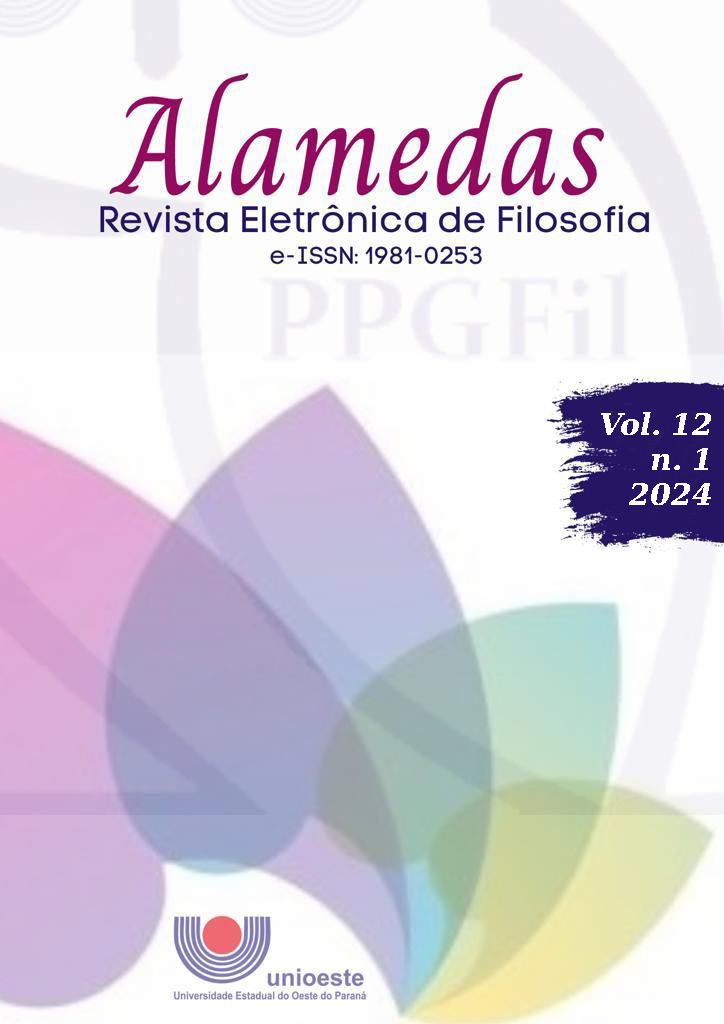A beleza interessada
a crítica de Nietzsche à estética de Kant
DOI:
https://doi.org/10.48075/ra.v12i1.32737Palavras-chave:
Friedrich Nietzsche, Immanuel Kant, Estética, BelezaResumo
Este trabalho propõe uma análise da crítica de Nietzsche à estética de Kant com foco na noção de beleza. Kant argumentou, em sua Crítica da faculdade de julgar, que a apreciação estética do belo ocorre de modo desinteressado, promovendo uma suspensão dos instintos sensíveis e racionais. Nietzsche contestou essa visão na Genealogia da moral, argumentando que a apreciação do belo está intrinsecamente relacionada aos nossos desejos, paixões e interesses individuais. Primeiro passando pela leitura de Heidegger, de que Nietzsche, devido à influência de Schopenhauer, tenha talvez interpretado equivocadamente a Kant, o artigo busca mostrar a interpretação de Nietzsche da “beleza desinteressada” enquanto fruto da má consciência em vista de desacreditar haver algo como não-egoísmo. Em seguida, expõe a argumentação apoiada na compreensão de que o belo estimula nossas forças, vivências e desejos, dando sustento à noção de beleza interessada. Por fim, a partir da concepção epistemológica do perspectivismo, aborda-se a rejeição de Nietzsche da noção de sujeito transcendental de Kant e do modo como, ausente de sujeito, restam apenas as forças e suas dinâmicas de vontade de poder.
Downloads
Publicado
Como Citar
Edição
Seção
Licença
Copyright (c) 2024 Alamedas

Este trabalho está licenciado sob uma licença Creative Commons Attribution-NonCommercial-ShareAlike 4.0 International License.
Aviso de Direito Autoral Creative Commons
Política para Periódicos de Acesso Livre
Autores que publicam nesta revista concordam com os seguintes termos:
1. Autores mantém os direitos autorais e concedem à revista o direito de primeira publicação, com o trabalho simultaneamente licenciado sob a Licença Creative Commons Attribution que permite o compartilhamento do trabalho com reconhecimento da autoria e publicação inicial nesta revista.2. Autores têm autorização para assumir contratos adicionais separadamente, para distribuição não-exclusiva da versão do trabalho publicada nesta revista (ex.: publicar em repositório institucional ou como capítulo de livro), com reconhecimento de autoria e publicação inicial nesta revista.
3. Autores têm permissão e são estimulados a publicar e distribuir seu trabalho online (ex.: em repositórios institucionais ou na sua página pessoal) a qualquer ponto antes ou durante o processo editorial, já que isso pode gerar alterações produtivas, bem como aumentar o impacto e a citação do trabalho publicado (Veja O Efeito do Acesso Livre).
Licença Creative Commons
Esta obra está licenciada com uma Licença Creative Commons Atribuição-NãoComercial-CompartilhaIgual 4.0 Internacional, o que permite compartilhar, copiar, distribuir, exibir, reproduzir, a totalidade ou partes desde que não tenha objetivo comercial e sejam citados os autores e a fonte.


